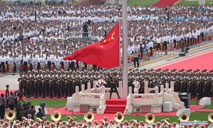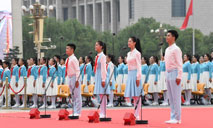The great spirit Chinese Communists draw strength from
BEIJING, June 27 (Xinhua) -- Throughout the 100-year history of the Communist Party of China (CPC), generations of Party members have formed a constellation of spirit that inspires generations to come.
Forged after the founding of the People's Republic of China (PRC) in 1949, the indomitable spirit of dedication, sacrifice, self-resilience, and blazing the trail, among others, provides a powerful source of strength for Chinese Communists.
THE SPIRIT OF RESISTING U.S. AGGRESSION & AIDING KOREA
Not long after the founding of the PRC, Chinese People's Volunteers (CPV) entered the Democratic People's Republic of Korea (DPRK) to fight the War to Resist U.S. Aggression and Aid Korea (1950-1953) at the request of the DPRK.
Despite a wide disparity of weaponry and equipment, the forces of China and the DPRK defeated their armed-to-the-teeth rivals in the face of overwhelming odds. They thereby shattered the myth of invincibility of the U.S. military.
It was a hard-earned triumph. The victory in the war defied the invasion and expansion of imperialism, safeguarded the security of the PRC, stabilized the situation on the Korean Peninsula, and upheld peace in Asia and the world.
During the war, the CPV demonstrated patriotism, bravery, optimism, duty, sacrifice, and internationalism, which was later called the spirit of resisting U.S. aggression and aiding Korea.
Chinese people have always remembered and will continue to recall this bloody fight and great triumph. The spirit of resisting U.S. aggression and aiding Korea will keep inspiring the country to brave the winds and waves and push forward the great cause of socialism with Chinese characteristics in the new era.
THE "TWO BOMBS AND ONE SATELLITE" SPIRIT
The successful development of nuclear bombs, ballistic missiles, and satellites represents the country's key achievements in the early days of the PRC.
Under fragile material and technological conditions, China detonated its first atomic bomb on Oct. 16, 1964, and its first H-bomb on June 17, 1967, and fired its first ground-to-ground missile with a nuclear warhead on Oct. 27, 1966. On April 24, 1970, it put its first satellite into orbit.
The successes of the detonation of the bombs, missiles, and the launch of the artificial satellite in the early days of the PRC are collectively known as "two bombs and one satellite" in China.
The events nurtured a particular ethos, featuring patriotism, dedication, and lasting self-reliance, hard work, cooperation, and courage in overcoming difficulties and obstacles. This has become a valuable spiritual asset for the Chinese people, especially those working in the scientific and technological fields.
THE SEZ SPIRIT
In 1980, the Party and state authorities approved establishing special economic zones (SEZs) in Shenzhen, Zhuhai, Shantou, and Xiamen.
The establishment of the SEZs is a particularly innovative concept by the CPC and the country in advancing reform, opening-up, and socialist modernization.
A flagship of China's SEZs, Shenzhen ranked among the leading Asian cities in gross domestic product.
The miraculous development saw thousands of innovative, courageous, and hard-working people moving into the SEZs from all over the country. They built their careers, started their families, and made contributions to various aspects of the cities from ground zero.
The SEZ spirit emphasizes the spirit to explore, break new ground, and work tirelessly. It will serve as an inexhaustible source of inspiration for the Chinese to rise to challenges in difficult and unpredictable times ahead.
Photos
Related Stories
- Highlights of foreign congratulatory messages on CPC's 100th founding anniversary (18)
- Highlights of foreign congratulatory messages on CPC's 100th founding anniversary (16)
- Highlights of foreign congratulatory messages on CPC's 100th founding anniversary (15)
- Israeli party leader highlights CPC's commitment to serving the people
- Power of belief: How CPC members make a difference
- Flower beds adorn Beijing for CPC's 100th founding anniversary
- Young Party members put dreams into action
- China’s ‘whole-process democracy’ explained
- What's behind CPC's lasting charm among youth
- Non-CPC personages to conduct democratic oversight on Yangtze River protection
Copyright © 2021 People's Daily Online. All Rights Reserved.










